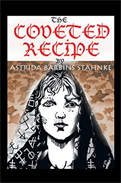
 |
Mara Liebman, a skilled baker, has left her hometown for mysterious reasons. She ends up at Fernau, a walled-off town, where she is put to work as the town’s baker to meet the Henker’s demand for sweets. Mara’s baked goods are so delicious that the Henker and his citizens repeatedly ask for the recipe, which she refuses to share. But the fear of the Bakkerhexe runs deep in the community, as well as the Henker’s greed, and she soon finds people’s suspicions turned against her. Will Mara be able to prove her innocence, or will she succumb to the same fate as the women before her?
The author weaves a dark fairy tale for the reader, incorporating historical events and various folklore into her story. Drawing inspiration from medieval witch hunts, as well as pagan practices, the result is a tale of individual strength and perseverance against ignorance. Witches have always been a big part of fairy tales and lore and have recently been reclaimed as feminist symbols in modern times. It’s accepted and understood now that the fear of witches was generally rooted in either misunderstanding, jealousy, or even political motives against women who were highly skilled or living outside the norm. The author illustrates this point by combining Mara’s storyline with that of Katharina Schraderin, a baker who was also persecuted for her recipes in the 1600s.
Some of the more lighthearted moments in the book are when the Livonian people are recounting their tales, and when Mara meets the raganas in the woods. Here, she learns of her heritage and the good that can come from acknowledging her roots. The author doesn’t dispel the notion that magic exists, but rather reframes magic in this story as power and knowledge.